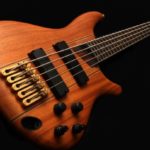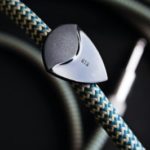Bass Effects - Flanger
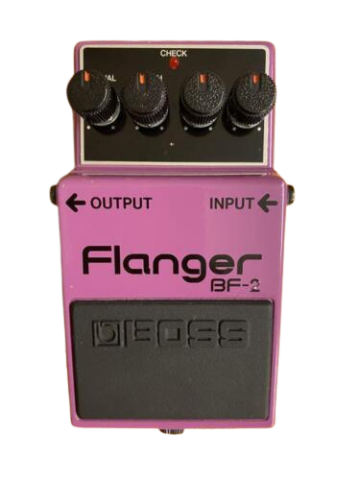
Flanging is another modulation effect which creates a kind of swooshing, jet plane-type sound.
Flanging sounds very similar to phasing, but it is produced in a different way. Remember, phasing was created by phase-shifting a copied signal. Flanging is created by using delay.
The flange effect takes an audio signal and copies it. A very short delay of less than 10 ms is applied to the copied audio signal and is mixed with the original audio signal. This creates a “doubled” sound.
Using an LFO, the delay time is constantly changed (modulated) creating the swirling, swooshing flange effect.
Flanging was discovered by guitarist and inventor Les Paul in the 1940s. While playing two reel-to-reel tapes back simultaneously, he touched one of the reels on its flange. This slowed down one tape and caused the flanging sound. He was intrigued, and explored the sound. Several years later, he released the song Mammy’s Boogie using the effect in a recording for the first time.
The first big hit to use the flange effect was Toni Fisher’s The Big Hurt. We hear this effect all of the time now, but in the 1950s it was revolutionary. The flange effect is on the entire recording.

Early flanging effects were created with tape (or sometimes two records). Eventually, when electronic delay technology became possible, electronic flanger units and effects pedals were developed. And now the same effect can be created digitally with software.
With these advancments, it became easier to add the flange effect to a single instrument or track.
There are tons of flanger pedals available for bass and guitar. It’s also possible to create flanging with some delay pedals.
“Music comes from the musician, not the instrument.” … Victor Wooten
Settings for the flanger effect are fairly simple:
Speed or Rate – the frequency of, or how fast, the LFO is modulating the delay time. (Usually in Hz.)
Amount or Depth – the amount of delay used.
Feedback – Some flangers may take the flanged sound and run it back through itself compounding the effect.
Use your ears and good taste to find the sound you want.
Examples of Flanging on Bass
The O’Jays – For the Love of Money
Anthony Jackson’s bassline on For the Love of Money is possibly the most well-known flanging bass example.
Yes – Tempus Fugit
After a few seconds you can really hear the flange effect kick in on Chris Squire’s bassline in Tempus Fugit. It gives the entire tune a giant swirling sound.
Tool – Forty Six & 2
One more example just for you Tool fans! Listen to the jet-like swoosh sound on Justin Chancellor’s bassline to Forty Six & 2. It really adds an other-worldliness to the song.
Recommended Bass Flanger Pedals
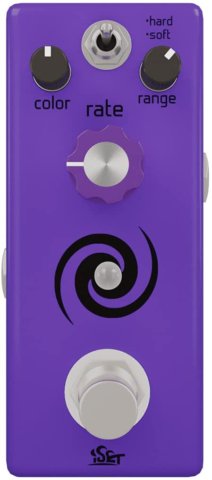
ISET Analog Galaxy Flanger
This Iset Flanger Pedal has a solid metal housing and weighted knobs with easy to read labels. While it has a solid build, the mini size also allows it to be lightweight, easy to travel with, and leaves plenty of room on your pedalboard.
EX-Swoosh Flanger
EX- Swoosh is a classic sounding flanger pedal. From a mild flutter to jet plane takes-offs, this pedal can do it all.
The four controllers provide ample options to dial in various rates, depth and resonance. The manual function gives you complete control.
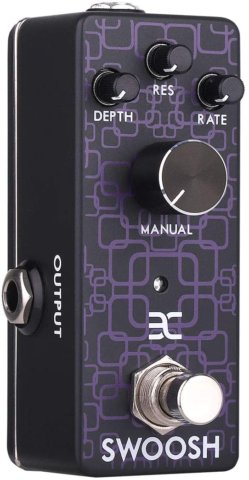
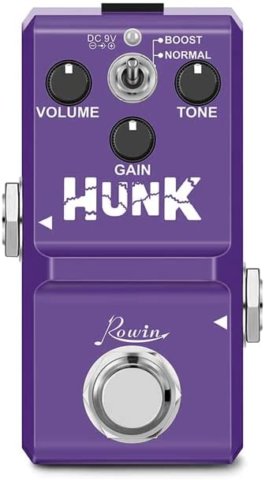
Rowin Nano Mini Electric Overdrive Flanger
Rowin Nano Series Digital Effect Pedal for Electric Guitar and Bass
TC Electronic THUNDERSTORM FLANGER
THUNDERSTORM FLANGER perfectly captures the classic analog flanger tones of yesteryear from subtle, tape-like sweeps and lush chorusing – to a no-holds barred flanger frenzy!
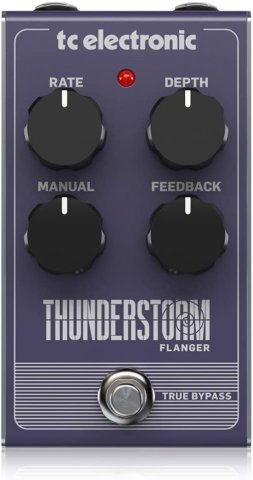

TC Electronic VORTEX MINI FLANGER
Ultra-compact flanger pedal with built-in TonePrint technology gives you massive flange sound diversity
Classic tape mode effect offers the authentic psychedelic flange sound of the sixties

Vivlex LEF-312 Flanger
Are you looking for a professional, yet affordable flanger guitar effect? Are you in search of a sturdy, trustworthy tool that can do multiple jobs at once? If yes, look no further! Our professional flanger guitar effect must meet your needs.














